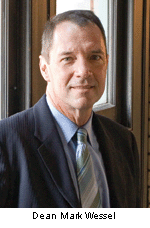William Cooper, the first dean of the H. John Heinz III School of Public Policy and Management, described the school as a place that "prepares men and women for intelligent action." And this "action" changes the world. Since 1970, our faculty, students and alumni have been dedicated to increasing the understanding of social issues in the U.S. and around the world and helping to stimulate real and lasting change. But we do not do this alone.

Americans crave simple technical fixes for many public problems: just have the engineers make computer networks so secure that hackers can't get into them. Or build electricity grids that never allow blackouts. Or develop "green" technologies that eliminate emissions and stop global warming.
All laudable goals, but the messier reality is that human and social factors—the nature of markets, the structure of organizations, the power of law, culture and tradition—are the context for any technology, and failure to understand that context can be fatal to the most elegant technical idea. These are the questions which Heinz School faculty and students work on collectively with technologists and artists.
The fact is that while the Heinz School may be the "policy" school, we are hardly the only policy voice on campus. In history, faculty are working on public health issues; in decision sciences, they are looking at risk taking; in fine arts, the architects work on urban policy; in chemistry, faculty are developing water treatment technologies, and the Tepper School has internationally prominent thinkers on macroeconomic policy. Our engineering school has its own public policy department, the only one of its kind in the nation.
Heinz School students benefit tremedously from this fertile environment. They learn to understand this messy reality and the many ripple effects that social change can have in the world and to guide the course of that change. They learn to analyze problems and develop the technical, organizational and political skills they need to implement new ideas. They cannot be successful leaders without this set of skills.
We encourage them to take on the biggest, toughest questions, and to think about social issues in new ways. For example, today we deal with drug abuse and other antisocial behavior in one of two ways: either we throw people in prison or, once they are certified addicts, we give them therapy. Professor Daniel Nagin and his colleagues are proposing a third way: he is building statistical models that identify three-year olds at high risk for drug abuse or antisocial violence when they become teenagers. What can we do for them at age 3 that can put these young people on a different path? What support systems could be put in place to change their trajectories? In 20 years, I hope this will be the dominant—not to mention more humane and productive—method of dealing with drug users. That is the kind of thinking we love.
Clearly, research at Carnegie Mellon is very practical. Advances in knowledge immediately lead us to ask how new knowledge may be applied to improve society. And that, at its core, is public policy. The fact that faculty from every discipline are concerned about those issues makes Carnegie Mellon absolutely distinctive. To be the policy school in this university is to have many wonderful partners.
Mark Wessel is dean of the H. John Heinz III School of Public Policy and Management.
Related Links:
Mark G. Wessel
Heinz School
Tepper School of Business
People of Heinz
Research at Heinz



